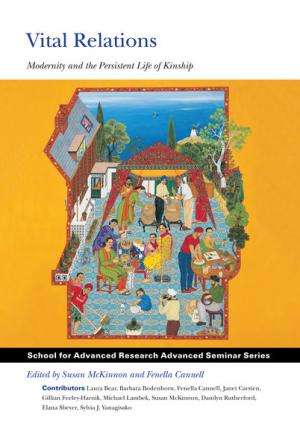Family still matters: U.Va. anthropologist's book correlates kinship and modern economics

In modern society, most Americans assume that home and work are separate, and that kinship has little or no role in the workplace.
Not so, said University of Virginia anthropology professor Susan McKinnon. Vital Relations: Modernity and the Persistent Life of Kinship, a new book edited by McKinnon and Fenella Cannell of the London School of Economics, challenges these ideas.
The book's essays came from the proceedings of a weeklong seminar, "The Difference Kinship Makes: Rethinking the Ideologies of Modernity," held in March 2010 at the School for Advanced Research in Santa Fe, N.M. Cannell and McKinnon convened a group of scholars who have been at the forefront of recent innovations in the study of kinship across the world.
In "Vital Relations," McKinnon, who chairs U.Va.'s anthropology department, and the other contributors re-evaluate 150 years of social science theory on modernity, describing a variety of cases around the world that show how kinship ties still play an influential role in business and other areas, such as religion, nationality and politics.
"How does kinship work in modern society? The question is worth asking, given the high number of family firms that are so much a part of modern society," said McKinnon, who has also published "Complexities: Beyond Nature and Nurture" and "Relative Values: Reconfiguring Kinship Studies," among other scholarly articles and books.
Much of America's wealth lies with family-owned businesses, which make up 80 percent to 90 percent of all business enterprises in North America, according to the Family Firm Institute Inc. And we're not just talking about mom-and-pop retail stores here; Wal-Mart, Koch Industries and Mars are all family-owned, for example.
Anthropologists, sociologists, historians and others have long worked from the idea that so-called traditional societies were structured around relations of kinship, McKinnon said. As modern societies have developed, the theory goes, kinship has lost that importance, replaced by nationality, the market and law.
She and the book's other authors don't deny kinship's continued importance in the domestic domain. But since kinship and modern organizations have been considered mutually exclusive, it has been almost impossible to analyze how family relations operate in the economic and political domains, McKinnon said.
The anthropologists in the book are developing new ways to account for the vitality of kinship relations in economic and political institutions and processes.
One way the research is relevant to business is in illuminating the relationship of kinship to corporate formation and innovation itself in a transnational context, McKinnon said.
For example, in the chapter essay, "Transnational Family Capitalism: Producing 'Made in Italy' in China," Sylvia J. Yanagisako analyzes family firms in the textile and clothing industry in Como, Italy. Some Italian companies have formed joint ventures with Chinese firms and outsourced production to cheaper Chinese labor markets. In Italy, family members run the company and work in the top positions. Non-family Italians can work in managerial positions at the Chinese locations, but Chinese employees do not get hired into top positions.
McKinnon and Cannell summarize the situation in the book's introduction:
"These Italian managers and their allied Chinese entrepreneurs (all of whom have been trained in business schools to take the separation of kinship and economy as a normative ideal) find themselves confronted with what Yanagisako calls a 'kinship glass ceiling.' In what might be read as an ironic turn, Chinese entrepreneurs are surprised to find themselves in business with Western firms that are organized by the communal sentiments of kinship and family rather than the supposedly 'modern,' rationalistic, managerial logic they learned about in business school."
McKinnon added, "Understanding the structure, dynamics and values that are central to intergenerational family continuity is critical to comprehending both how family corporations develop, innovate and position themselves in both local and global markets, and the distinct advantages they have in these markets."
When kinship does show up, especially related to workers' reactions about their jobs, it's often seen in a negative light, as backward, she said, and not taken seriously, much to the employees' dismay. Different notions of the importance of kinship to the process of production can affect the relations between owners or managers and workers, contributors to the book have found.
In another essay in Vital Relations, Laura Bear focuses on the skilled shipyard workers on the Hooghly River in western India who build massive ice-class vessels for multinational corporations.
McKinnon noted that "While these multinational corporations attempt to structure labor in terms of flexible, short-term contracts, the laborers themselves seek to structure their relations with managers on a model of trust and long-term exchange relations between kin and friends. This is seen as critical to the life-sustaining relations that workers see as central not only to the reproduction of families but also to their productive powers in the shipyard, itself."
The supposedly "more flexible neoliberal economic order – where owners and managers cultivate short-term and expendable commitments with workers that maximize profit margins, but leave workers' basic life support highly vulnerable to the fluctuating movements of capital and sites of production" – leads the workers to describe feeling a "burning of the stomach," she said.
Provided by University of Virginia















